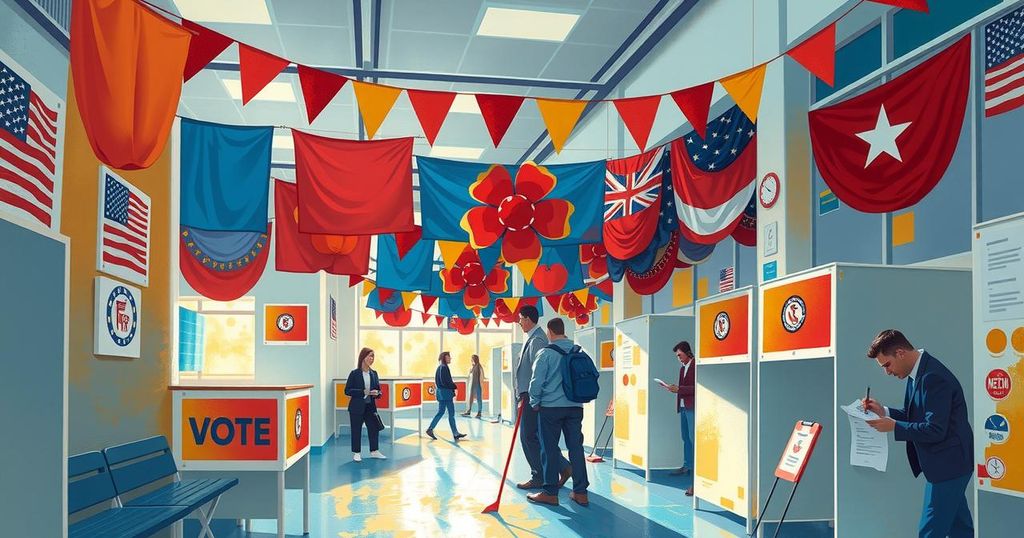Philippine Midterm Elections: Key Players and Stakes in 2025 Showdown

The Philippines is holding midterm elections with over 18,000 positions at stake, notably 12 Senate seats, impacting Vice President Sara Duterte’s impeachment issues. Key figures in the elections include former President Rodrigo Duterte running for mayor in Davao, and Bongbong Marcos’s diverse senatorial ticket. Tensions between the Marcos and Duterte families have grown since their joint electoral victory in 2022, with both families facing a potential political crisis as the future of their legacies hangs in the balance.
Millions of Filipinos are participating in the midterm elections today, as more than 18,000 elected positions are contested throughout the nation. Polling commenced at 07:00 local time and is slated to conclude at 19:00. Among the most significant seats up for grabs are the 12 contested Senate positions, which hold the potential to affect the upcoming impeachment proceedings against Vice President Sara Duterte.
Local elections will also be a focal point, with mayors, vice mayors, and city councillors on the ballot. Meanwhile, former President Rodrigo Duterte, 80, is running for mayor of Davao City despite facing legal challenges from his time in power. In the House of Representatives, there are a total of 317 seats, with 254 directly elected from their respective districts and 63 chosen from party lists.
Rodrigo Duterte’s senatorial ticket includes prominent figures such as Bong Go, his longtime aide, and Ronald dela Rosa, the former police chief linked to the controversial “war on drugs.” This slate, known as DuterTen, features a mix of political allies, including a fugitive pastor and several loyalists from the PDP-Laban party, traditionally seen as a bastion of pro-democracy ideals.
On the other hand, Bongbong Marcos’s senatorial list boasts several notable individuals, including former boxing champion Manny Pacquiao and figures from influential political dynasties. Marcos has formed a coalition called the Alliance for the New Philippines, which aggregates power from various established families alongside wealthy business interests. One candidate, Camille Villar, is seeking to succeed her mother in the Senate, highlighting the dynastic nature of Philippine politics.
This election follows the victory of the Marcos-Duterte coalition in 2022. After that overwhelming win, cracks began to emerge between these two influential families. Once seen as a cohesive alliance, tensions have intensified, raising questions about shared ambitions and governance.
Despite being detained at The Hague, Rodrigo Duterte is aiming for a political comeback in Davao City, where he hopes to reclaim the mayorship he previously held. His current push for power is underscored by the potential for his son, Sebastian, to take over as vice-mayor. Should both rise to power, the Duterte dynasty would maintain its grip on Davao politics as it has for decades.
For the Marcos and Duterte families, the stakes are incredibly high. Bongbong Marcos is seeking to validate his leadership as well as strengthen his Senate majority, potentially influencing the outcome of the impeachment case against Sara Duterte. If Sara is barred from a presidential run, it could signal a devastating blow to the Duterte family’s political future. Likewise, with a limited presidency term in place, Marcos faces pressure to install a supportive successor to avoid facing legal repercussions.
The midterm elections in the Philippines represent not just a choice for local and national leaders but will also signify the current political climate between these dynastic powers as the future of national governance is shaped. Voter turnout may well indicate support for Sara Duterte’s potential presidential bid in 2028, a move that remains speculative but is widely anticipated amid shifting alliances.
As the elections unfold, they are being closely monitored both domestically and internationally, given the implications they hold for the stability of both families and the broader Philippine political landscape.
In summary, the midterm elections in the Philippines are pivotal, with significant stakes for both the Marcos and Duterte families. As millions cast their votes for critical Senate and House positions, the outcomes could deeply influence future political dynamics, particularly concerning Vice President Sara Duterte’s potential impeachment and her aspirations for the presidency. As allegiances shift amidst this fierce rivalry, the results may redefine power in the Philippines.
Original Source: www.bbc.com






